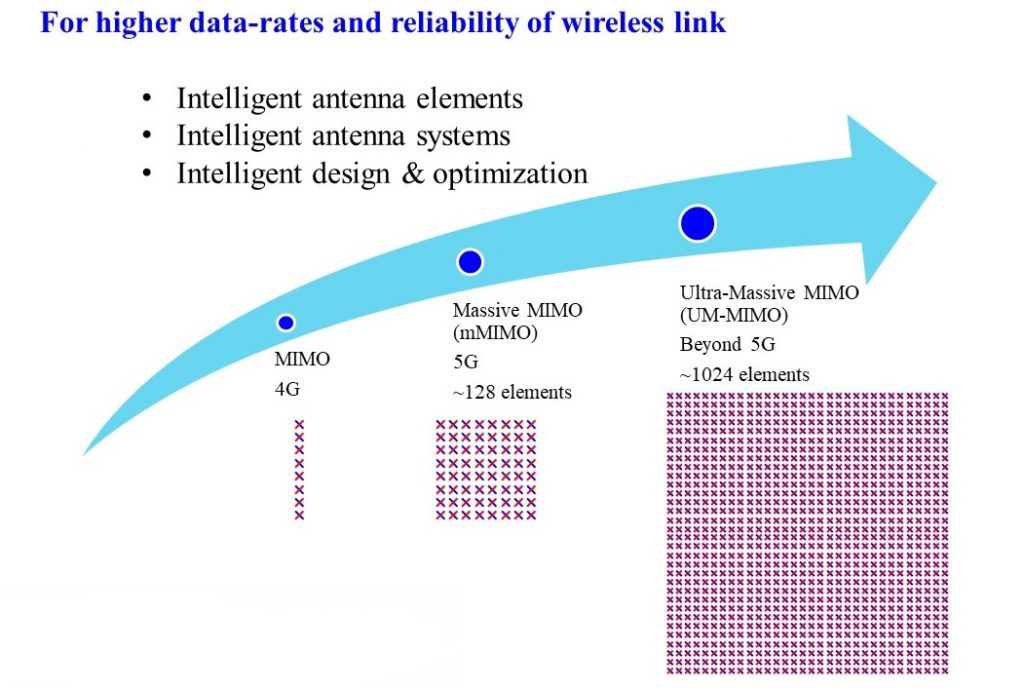-
- ARIS-RP1: Design and Characterization of Ultra-Large-Scale Intelligent Electromagnetic Surfaces Using Deep Learning
- ARIS-RP2: Reprogrammable Meta-optics for Information Multiplexing
- ARIS-RP3: Making Wireless Communication Environment Smart via Reconfigurable Intelligent Surfaces (RIS): A New Network Optimization Perspective
-
- FCT-RP1: Practical Data Storage and Computation in DNA Molecules
- FCT-RP2: Amorphous-Oxide-Semiconductor Thin Film Transistors and DRAM Cross-bar to Enable 3D Monolithically Integrated Architecture for Near/In-memory Computing
- FCT-RP3: Neural-like Computing System based on Superparamagnetic Tunnel Junctions
-
- HFM-RP1: Wearable Microneedle Patch for the Minimally Invasive Wireless Continuous Glucose Monitoring
- HFM-RP2: On-body computing for Next-generation Wearable Systems
- HFM-RP3: A Novel Optical Biometer to Monitor Myopia Progression in Children.
- HFM-RP4: Magnetoplethysmograph for Continuous Heart Rate and Blood Pressure Monitoring
- HFM-RP5: Manufacturing of Artificial SKin Integrated Network (SKIN) for Healthcare and Fitness Monitoring
- HFM-RP6: Radio-frequency Textile Sensors for Wearable and Ambient Health Monitoring
-
- ADT-RP1: Development of High Precision Additive Manufacturing for Integrated Complex Molding Applications
- ADT-RP2: Low Loss and Tunable Ferroelectrics for Sub-6G Applications
- ADT-RP3: Redox-mediated Flow Battery for Household Energy Storage
- ADT-RP4: Development of Nature-inspired Multiscale Composite Materials for High Strength and Low Loss Applications
-
- WDSS-RP1: Enabling Continuous and Realtime Monitoring of Human Vitals through Battery-free Tunnel Diode based Sensors
- WDSS-RP2: Wireless Communication and Radar Sensing Fusion Based Indoor Localization
- WDSS-RP3: Multi-parameter Sensing Platform for Proactive Hypertension Diagnostics Using Artificial Intelligence
- WDSS-RP4: LightChips: Light-Based Integrated Cloud-to-Edge Communications, Sensor Node Wake-Up and Indoor Positioning for mm-Scale Purely-Harvested Systems
ARIS-RP1: Design and Characterization of Ultra-Large-Scale Intelligent Electromagnetic Surfaces Using Deep Learning
Principal Investigator: Professor Chen Zhi Ning, ECE
Co-Principal Investigator: Liu Peiqin (Dr), ECE
Employing ultra-large-scale (ULS) intelligent surfaces is a trend for controlling electromagnetic (EM) waves in wireless systems such as improving the coverage, robustness, and data rate of future wireless systems. The surfaces usually comprise an array of unit cells (elements or pixels). The functionality and performance of the surfaces can be intelligently adjusted or optimized to respond to the variation of environments or tasks. The surfaces include but not limited to metasurfaces, passive scattering surfaces, multiple radiator arrays, and so on. All the surfaces can be reconfigurable, tunable, and adaptable.
This project aims to explore the characterization, optimization and design methodology of new types of ULS intelligent surfaces for EM wave control for future wireless systems. 1) We are going to propose new types of unit cells and configurations for compact, high-performance and reconfigurable ULS surfaces. An ultra-large-scale and ultra-dense intelligent surface will comprise thousands of unit cells or even more with huge volume. 2) We are going to apply new mathematical modeling methods such as deep learning (DL) in the modeling, characterization and optimization of EM waves for human-intelligent extendable design, automatic design, automatic diagnosis and self-healing, computing resources and time saving design and optimization of ULS surfaces.
The project is to focus on research into the fundamental scientific and engineering challenges for future wireless communication, detection, and imaging systems.



